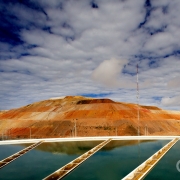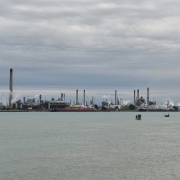In Maryland, Vulnerability to Water Shutoffs Depends on Your Address
New report highlights how local laws can trap households in a cycle of fees that influence water affordability, shutoffs, and timely bill payment.

Local laws vary significantly in how they address late water bill payments. Photo © J. Carl Ganter / Circle of Blue
By Brett Walton, Circle of Blue
Maryland towns and cities deploy a diverse arsenal of laws and policies against residents who fall behind on water bills, with some jurisdictions levying a barrage of additional fees that make it harder for financially struggling households to catch up.
Those are some of the findings from a wide-ranging report on municipal drinking water service laws in Maryland. The report is the most comprehensive assessment within a single state of the local laws and policies that control access to water after a missed bill and for low-income households.
“Essentially what we found is that [local law] is incredibly meaningful, and that those municipalities do exercise their power in very different ways. It means that there can be significant disparities between two neighboring municipalities and I think that’s a powerful statement,” said Alexandra Campbell-Ferrari, executive director of the Center for Water Security and Cooperation, the nonprofit legal research group that produced the report.
As water rates climb in communities across the country, the cost of water and the number of homes that lose water service due to a missed bill have emerged as newly relevant public policy issues.
Utilities argue that the ability to shut off water to households is a necessary tool for ensuring that bills are paid on time. The report adds a shade of nuance to that claim. While they may deter households that would otherwise be unwilling to pay bills on time, shutoffs alone are a blunt object for those who are willing to pay but unable because of financial distress, Campbell-Ferrari and her colleagues argue.
“Shutoffs that punish nonpayment alone can breed fear and resentment, instead of understanding and value,” the report states.
When shutoffs are the remedy, more pain — in the form of fees — can cascade onto residents who may already be financially overwhelmed.
The report describes four fees that utilities charge residents after they fall behind: for late payment, to disconnect water service, to reconnect water service, and interest on overdue bills. Nearly two out of three municipalities and counties in Maryland that permit shutoffs charge at least one of these fees, which can be large and, as the report argues, punitive. To turn off or reconnect water service, utilities in Maryland charge residents between $10 and $100, the report found.
The town of Woodsboro, for example, charges residents $100 to reconnect service, in addition to 1.5 percent interest on overdue balances, and a prepayment equal to the previous billing amount. In the town of Trappe, households pay $35 when water service is shut off and another $35 to reconnect. The town also adds a 2 percent charge for the late payment.
Only two Maryland municipalities prohibit shutting off water service for overdue bills. Besides fees, local policies also differ on how many notices are required, the amount of time before a shutoff can occur, and the availability of bill subsidies or repayment plans.
“The authors do well to focus on things like the financial repercussions of late payments,” Stacey Isaac Berahzer, a utility finance consultant at IB Environmental, wrote to Circle of Blue in an email. “Utilities sometimes rely on these late payment fees as an important and (maybe sadly) a somewhat predictable source of revenue.”
Berahzer said that she has not seen reports for any other state that lay out local water access laws and policies in such detail. Maryland’s relatively small number of municipalities (157) and counties (23) helps, Berahzer said. In Georgia, where she lives, there are four times as many municipalities.
The fees add up, said Luke Wilson, deputy director of the Center for Water Security and Cooperation and a report co-author.
“The problem becomes deeply compounded as these fees get added on,” Wilson told Circle of Blue. “For people who are already in a financial hole, for whatever reason, a missed bill, particularly with all these other fees, can put water service out of reach and make it, if not permanently inaccessible, then at least deeply inaccessible for a long period of time.”
Some utilities offer a helping hand through aid programs that reduce the cost of water for families below the poverty line. But few such programs exist. Only one in three municipalities in Maryland has a financial assistance program, the report found.
Circumstances in Maryland mirror conditions nationally. A Circle of Blue investigation of water shutoff policies in a dozen large cities found a dozen different ways to determine which late-paying customers would have water service turned off. For residents who fall behind in their water bills, aid is unlikely to arrive. A 2016 U.S. Environmental Protection Agency review of 795 utilities, mostly those serving more than 100,000 people, found that more than seven out of 10 did not have a customer assistance program. Those that operate an assistance program have very few enrollees disconnected for nonpayment. In San Francisco, according to data provided by the San Francisco Public Utilities Commission to Circle of Blue, only one household in the assistance program had water turned off in 2017.
A report that Berahzer worked on while she was at the University of North Carolina’s Environmental Finance Center found that state laws are an obstacle for establishing customer assistance programs at the utility level. In California, fewer than half of residents are served by a utility that offers a bill subsidy or another program to lower the cost of water. Regulators there are developing a proposal for the nation’s first state-run water bill aid program.
Federal aid programs exist for food and energy bills, but none for water. Efforts in Congress in recent years to establish such a program have garnered little support.
The report does not make recommendations. This was by design, said Campbell-Ferrari, who also teaches water law at the University of Maryland. She and her colleagues wanted first to establish a baseline understanding. Though they scoured the state for local policies, much data — on the number of shutoffs, for example, and how many are because people were unable to pay — is still unavailable.
“We don’t make a judgment call about [legal disparities] because we’re trying to get a sense as to what the challenges are and we’re trying to initiate a conversation about it,” Campbell-Ferrari said. “If there’s this disparity that is generated across the state, is that what we want? Is that our public policy for the state? Is this the result that we’re looking for and if not, what would we do instead?”
Brett writes about agriculture, energy, infrastructure, and the politics and economics of water in the United States. He also writes the Federal Water Tap, Circle of Blue’s weekly digest of U.S. government water news. He is the winner of two Society of Environmental Journalists reporting awards, one of the top honors in American environmental journalism: first place for explanatory reporting for a series on septic system pollution in the United States(2016) and third place for beat reporting in a small market (2014). He received the Sierra Club’s Distinguished Service Award in 2018. Brett lives in Seattle, where he hikes the mountains and bakes pies. Contact Brett Walton












Leave a Reply
Want to join the discussion?Feel free to contribute!